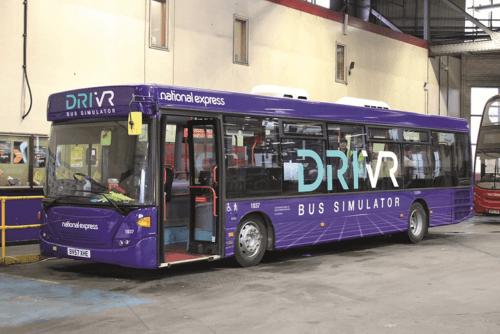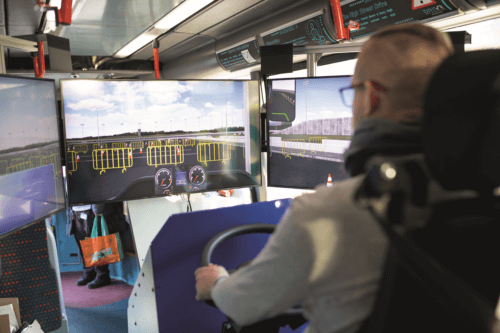 A possible industry first is happening in the West Midlands with the introduction of a new Simfor bus driving simulator to help train drivers
A possible industry first is happening in the West Midlands with the introduction of a new Simfor bus driving simulator to help train drivers
What is believed to be a first of its kind virtual reality bus driving simulator has been created aboard a bus for National Express West Midlands. Using the ‘DriVR’ machine’s 360-degree image, bus drivers can tackle a variety of driving scenarios including severe weather, driving in the dark and emergency braking, which the operator says simulates a real life trip out on the road without the risks.
The simulator allow drivers to experience scenarios which are classed as high-risk on the road, and also means they can choose to reset and repeat the scenario or manoeuvre until they feel confident. Jenny Tocknell, Head of Operations at National Express West Midlands, explained: “National Express bus drivers are the best in the country. But we’re always looking at what more we can do around safety standards. So we are very excited to be the first business in the UK to have a Simfor driving simulator.
“These machines are a significant investment for the business, costing £30,000. But it’s a really efficient way of working on any driving behaviour and all 300 drivers who have used it so far have given 100% recommendation to others.
“Using the DriVR simulator means we can provide training on high-risk manoeuvres without the risk of doing that on the training yard. This is revolutionary and showcases how far ahead National Express are when it comes to safety.”
National Express West Midlands is currently the only business in the UK to use the Simfor kit, which arrived in June from Spain. It plans to have four of the simulators within the business by early 2023. Simfor’s Head of Business Development Alexia Alvarez explained: “Simulation has been long used for professional training in high-risk sectors and it was just a matter of time for the passenger transport sector to apply it. It’s very exciting for us to be working with National Express, as it is our first client in the UK. Our intention is to grow together to create real, justifiable results that can be extrapolated to other areas of the company and industry.

“We hope that these first four units will be just the beginning of a proliferation thanks to the success of National Express’s internal training which could open doors to new business opportunities for both parties.”
The first simulator was installed at the National Express bus depot in Coventry, with a second set up on a dedicated National Express bus that can travel around the company’s other depots and visit recruitment shows, enabling current and future drivers to take a turn in experiencing the digital world of the job. Over 50 members of the public were recently given the opportunity to try the simulator at National Express Coventry’s careers fair in Coventry.
A further two simulators will be installed at National Express West Midlands’ training academy in Walsall and its new depot in Perry Barr, which opened earlier this month. Recent trainee and qualified drivers commented on their own individual experiences: “I feel more prepared for when I start my on-the-road training. I was surprised just how big a bus is and how different it is to driving a car. Thanks to the simulator, I feel like I’m one step ahead,” said one. Another added: “It was great having training to help me with bus stops on the simulator. My trainer was able to explain why I should approach bus stops differently and why it will benefit my own and my passengers’ safety. This new method of training is much better than traditional methods. It can prepare us for so many different scenarios in a safe risk-free environment.”
Performances can be monitored and evaluated via personal IDs created through fingerprints which instructors can then use to adapt training programmes to various scenarios and needs. Once National Express West Midlands’ 3,500 bus drivers are all simulator trained, the company plans to start using the technology with its coach drivers too.

